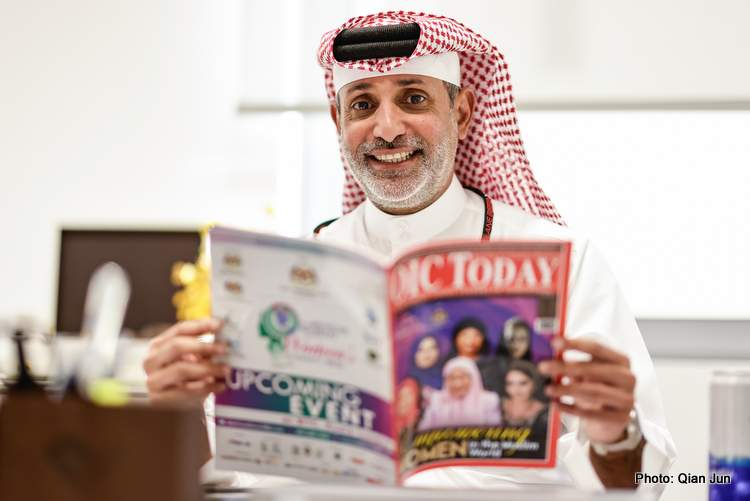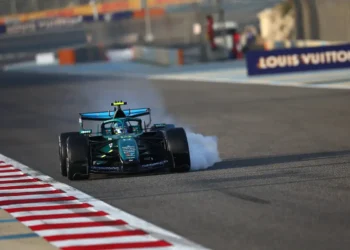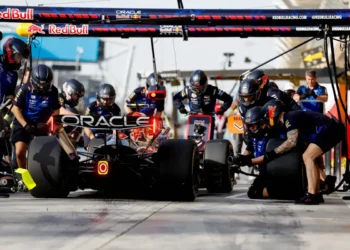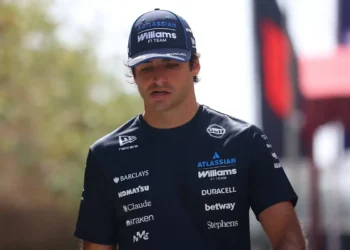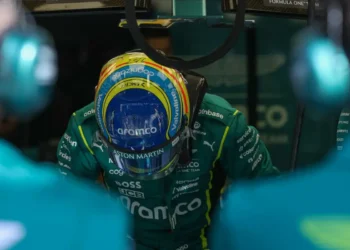Sheikh Salman Bin Isa Al Khalifa graduated from National American University in Denver, Colorado, where he studied Applied Management. In 2004, he took up his official position at the Bahrain International Circuit (BIC) as Chief of Government Affairs.
He actively contributed to the circuit’s involvement in the Bahrain community, as well as enhancing the country’s positive image for the numerous international visitors and media who come each year.
In addition, Sheikh Salman worked for the General Organization for Youth and Sports in Bahrain and held the position of Vice President of the Bahrain Motor Federation. He also served on various sports advisory boards, including the FIA Single-Seater Commission and the Formula 1 Commission.
In the early 2000s, the story goes that F1 supremo Bernie Ecclestone negotiated a deal with Sheikh Mohammed Al Maktoum for a Grand Prix in Dubai. However, due to a possible misjudgment by the ruler of the Emirate, the FOM delegation had to wait for a long time.
As a result, Bernie decided to fly to Bahrain, where he received a warm welcome. This ultimately led Bahrain to host the first F1 race in the Middle East, while Dubai missed out on the opportunity. Instead, Abu Dhabi became the proud host of a Grand Prix.
The successful hosting of the F1 race in Bahrain triggered a racing fever in the Middle East, with Abu Dhabi being added to the F1 calendar and Saudi Arabia and Qatar following suit. It is worth noting that Saudi Arabia now hosts the season-opening race and is the preferred location for F1 pre-season testing.
To celebrate the 20th Grand Prix held in Sakhir, Sheikh Salman conducted an interview at the circuit he and his team built for the country’s Grand Prix. He proved to be a charming and articulate host, displaying a deep passion for motorsport at all levels.
Agnes Carlier: Can you recall the process behind the decision to host the first F1 event in Bahrain and how you prepared for the first Grand Prix in 2004? Sheikh Salman: The agreement was made between Bahrain and Bernie Ecclestone. We were deeply passionate about this endeavor. We had a rich history in motorsport dating back to 1952, with strong support from the motorsport federation. This was a continuation of that legacy. Bernie Ecclestone then introduced us to Herman Tilke. From there, the journey began, with the construction of the track and obtaining the FIA agreement. It’s incredible to think that all of this happened twenty years ago, and it’s remarkable how this sport has driven progress and economic growth in Bahrain.
Agnes: The Bahrain Grand Prix marked the first race in the Middle East… Sheikh Salman: Indeed, Bahrain was a pioneer in the Gulf region. We were the first to host a modern Grand Prix in the Middle East, and today we are joined by Abu Dhabi, Qatar, and Saudi Arabia as they have followed Bahrain’s lead.
Agnes: Singapore in Asia joined the F1 calendar in 2008, while Abu Dhabi only joined in 2009 and Qatar in 2021. We also have races in Turkey, Malaysia, Korea, Suzuka, India, and Azerbaijan. Are you proud to have been the first Grand Prix in the Gulf? Sheikh Salman: Absolutely, the arrival of the Grand Prix in Bahrain is a historic moment for us. It has a tremendous impact on our country and allows us to drive the changes we aspire to make. Everyone who visits has the opportunity to witness our small island, competing with larger nations that host the Grand Prix.
Agnes: Do you believe that the Bahrain Grand Prix has played a significant role in the Gulf region? You refer to the GP as the main motorsport event in the Middle East… Sheikh Salman: The crucial aspect is not just the brief visit of the Grand Prix. We invest in our human resources, including stewards and track personnel. We supported our friends in India, Azerbaijan, and Saudi Arabia during their early years, sending our stewards and teams there. For example, we helped organize races in India for two years and in Baku for three years. The deal is that we offer assistance and they move forward. What matters to us is ensuring that neighboring countries in the Gulf or in Asia do not make the same beginner mistakes. We will not allow that. It is important for us to share our experiences and prevent others from making the same mistakes, saving time and costs for all parties involved. We reach out, based on our own experiences, and Bahrain offers its support.
Agnes: Hosting a night race makes it more appealing to spectators? Sheikh Salman: On our tenth anniversary, in 2014, we started hosting a night race. The Grand Prix weekends always used to take place on a weekday, specifically on Sundays. This arrangement is beneficial as schools are closed and people have finished their work, allowing them more time to watch the race.
Agnes: How does the Bahrain Grand Prix contribute to the country’s economy? Sheikh Salman: There is a direct impact. Consider the impact on hotels, car rental services, and restaurants. We commission a study by Bahrain’s economic council every two years, which shows significant growth. The race brings positive effects, with restaurants and hotels operating at full capacity, resulting in substantial numbers. This economic impact is consistent year after year. While not comparable, if we look at the Olympics, the impact is tremendous, but it only happens once every four years. After a country has hosted the Olympics, it is uncertain when they will have the opportunity to host them again. On the other hand, hosting an F1 Grand Prix for four consecutive years generates a significant economic impact.
Agnes: What is your most cherished memory in your two decades of history… Schumacher’s triumphant victory in the inaugural Grand Prix in 2004? Alonso’s consecutive victories in 2005 and 2006, and again in 2010? Massa’s impressive performances in 2007 and 2008? Jenson Button’s notable victory in 2009? Vettel’s dominant wins in 2013 and 2017? Hamilton’s incredible achievements in 2014, 2015, 2019, and 2021? Rosberg’s memorable victory in 2016? Leclerc’s success in 2022? Or Max Verstappen’s spectacular win in 2023?
Sheikh Salman: For me, the dearest memory is, without a doubt, when the five lights went out and we witnessed the Grand Prix in 2004! I can still vividly remember where I was. It was the moment our dream came true and we finally had the Grand Prix. Another significant memory for me is the 2014 race with Hamilton and Rosberg, where the crowd erupted in applause as the cars raced down the straight towards Turn 1. The atmosphere was electrifying and became known as the “Duel in the Desert”. That was truly unforgettable.
Agnes: Are you a racing enthusiast? Sheikh Salman: I have a great passion for racing. Although I do not consider myself a professional driver, I have participated in several events. My first experience was in the Middle East Porsche Super Cup. I also competed in various 24-hour races in Dubai, but they were GT races instead of single-seaters.
Agnes: Do you remember your emotions during the accident involving Romain Grosjean? Sheikh Salman: Without a doubt. We have a well-prepared “serious incident plan” that we practice during training with the stewards. It is something we study and work on, hoping we never have to implement it. The accident involving Grosjean demonstrated the effectiveness of our training and how everyone remained composed. Each person knew their role and carried out their tasks perfectly. There was no room for panic or confusion. Surprisingly, Grosjean managed to get out of the car in 28 seconds. However, repairing the damaged barriers on the track proved to be a more challenging task. Nevertheless, we were able to restore the concrete barriers in 25 to 30 minutes, allowing the race to resume. I remember that vividly. Fortunately, Grosjean escaped without serious injuries. This incident highlighted the strength of the halo and the significant advances in car safety made by the FIA, which have saved countless lives. Even the recent incident involving Hamilton and Verstappen in Monza showed remarkable progress in race car safety. It is truly remarkable.
Agnes: You brought this racetrack to life, something always happens here… Sheikh Salman: The track is constantly used by spectators and everyone is always welcome. Before COVID, we had approximately 300 events at the Bahrain circuit. After COVID, we are working to bring that back. This year, we have around 250 events planned at the track. The goal is to make the most of the track and all its existing facilities. During the week, we hold fitness activities on the track and invite guests to run and cycle here. The aim is to maximize the use of the track.
Agnes: What is your vision for this racetrack? Sheikh Salman: Over the past three years, we have always sold out. We have had over thirty thousand spectators, including the Paddock Club. The grandstands have a capacity of 35,000 seats. In the next three, four, or five years, we need to consider expansion. We have already expanded the Paddock Club and extended the team balconies to provide more space and comfort for their guests. Additionally, we need to modernize the track a bit. It has been 20 years since its foundation, and cars have also changed. They have become lighter and have more downforce. We are not only fixing things, but also focusing on modernizing the track. This is where our collaboration with the FIA comes into play, especially regarding track limits and other regulations. We had to make quick decisions on the track after the testing session.
Agnes: Does having a president like Mohamed Ben Sulayem make a difference? Sheikh Salman: Actually, no. The FIA remains the FIA, and our negotiations are done through the ASN. The rules remain the same. We are in Bahrain, and the president is in Dubai.
Agnes: Do you see United Arab Emirates, Bahrain, Saudi Arabia, and Qatar as competitors? Sheikh Salman: We do not see ourselves as competitors. Each of us has our own unique contributions in building the fan base. We do not have passionate fans like those in Japan or Europe. However, with the younger generation and platforms like Netflix, this is becoming increasingly important. People who were watching the races twenty years ago as children are now bringing their own children. It took twenty years to get to this point, and we are still working to expand the fan base. Fortunately, Saudi Arabia has opened up to motorsport, including Dakar and rallies. This is fantastic as we see an increase in the number of people crossing the bridge each year. Saudi Arabia has the highest ticket sales, and we have seen a significant influx of F1 fans from the UK, who spend on accommodations, food, and rentals. Now, with races happening on weekends instead of Sundays, it is even better as it allows more people to attend without work restrictions.
Agnes: What are your plans for this F1 season? Sheikh Salman: Our plan is to successfully complete the race tomorrow! However, I will probably be in Saudi Arabia as well…
Tomorrow, as mentioned by Sheikh Salman in his closing remarks, will be Friday, March 1st. This day will mark the qualifying session for the 2024 Bahrain Grand Prix, followed by race day on Saturday. During this race, we witnessed an impressive performance from Max Verstappen, who secured a dominant victory. Red Bull had a strong presence, securing the first two positions, with Verstappen leading the way and teammate Sergio Perez closely following, albeit with a considerable time difference of 22.5 seconds. The Ferrari duo, Carlos Sainz and Charles Leclerc, also fought well, chasing the leading Red Bull drivers.
The competition was intense, with Mercedes, McLaren, and Aston Martin in close proximity. It is worth noting that the result of Verstappen-Perez finishing first and second in last year’s Bahrain Grand Prix mirrored their positions in the final standings of the 2023 F1 Drivers’ Championship. This indicates that they are a formidable duo and are likely to remain strong contenders in the upcoming races.
Despite any doubts or uncertainties, the 2024 Bahrain Grand Prix was considered a resounding success according to local reports. It featured the largest attendance ever recorded in the two-decade history of the race on the F1 calendar. This remarkable participation is a testament to the vision, passion, and hard work dedicated to organizing the event. It is clear that a record number of F1 fans made the journey to Sakhir this year, considering it a sort of pilgrimage to witness the exciting races first-hand.
As the action unfolds on the track, the 20th edition of the GP in Sakhir has set the stage for an exciting year ahead. Nineteen drivers will be vying for the F1 world champion, Max Verstappen. Sheikh Salman, like all of us, will be watching with great interest, as racing runs in his blood as well.
© 2024
Soccer star Cristiano Ronaldo made an incredible play in yesterday’s game, leaving fans ecstatic with his skill. The player scored two goals and provided an assist, securing his team’s victory. Ronaldo once again showed why he is considered one of the best players in the world.
Furthermore, the game was full of excitement from start to finish. Both teams displayed exceptional performance, with amazing plays and many goals. Fans were on the edge of their seats throughout the match, not knowing which team would emerge victorious.
However, despite Ronaldo’s impressive performance, the standout player of the game was the young player from the opposing team. At just 19 years old, he showed impressive skill and maturity, scoring a hat-trick and standing out as a promise for the future of soccer.
Fans are eager to see what the future holds for these two talented players. With his exceptional performance, Ronaldo continues to win the hearts of fans and leave his mark on the world of soccer. There is no doubt that he will continue to be a legend of the sport.
Overall, the game was an exciting battle between two talented teams. The players showed their passion for the sport and provided an incredible spectacle for the fans. With so many exciting moments, this was a game that will be remembered by everyone for a long time.

